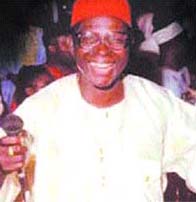


Posted by By SEGUN AJAYI on



Although, he stopped playing music in his later days, generations of fans of the highlife maestro, Chief Stephen Osita Osadebe, who passed on last weekend, in the U.S, during a brief illness, would miss him greatly, more especially for his soothing melody.
Although, he stopped playing music in his later days, generations of fans of the highlife maestro, Chief Stephen Osita Osadebe, who passed on last weekend, in the U.S, during a brief illness, would miss him greatly, more especially for his soothing melody.
According to family sources, the remains of the musician will be flown to the country at the end of the month when burial rites will commence.
Until his death was announced Monday, Osadebe was the leader of the Sound Makers Internationals, a group he led for about five decades.
An artiste of class whose music was inspired by his parents, the highlife crooner would be remembered for hit albums like, Ozondi Ewendi and Makojo. But before then, the legend had in his earlier days, released Enyi Mba Enyi, Late Patrice Lumumba, Nnamdi Azikwe, One Pound No Balance, Omonuju Aku, The First Raining Day, Onu Kwuru Njo Gekwu Mma, among many others.
Osadebe went through the mills of music making, and that accounted for his staying power on top of his profession. For instance, he started with what he tagged: Amakekwu, a genre that was in vogue in the 1950s. At different times, he played Kokoma of Ghanaian heritage, Kusimilaya, which was made popular by late Adeolu Akinsanya a.k.a. Baba Eto. By the time, he came up with his band, Osadebe soon became, what Fela was to afrobeat; a master.
With his Oyolima music, Osadebe succeeded in uniting his listeners across the country. His music is laden with strong messages and his lyrics are prophetic. He once confessed that, during his sojourn in the U.S, his fans often ascribed therapeutic effects to his songs.
Osadebe's music growth drew from calypso, samba, rumba, jazz, waltz, all of which are the core formative elements of highlife in its rustic form. The outbreak of the civil war in 1967 significantly stalled the development of his art. By the mid-1970s, his career had reached its zenith with the release of Osadebe 75.
Osita was a nationalist and a detribalized Nigerian having used his talent to reach out to Nigerians of diverse tribes. He demonstrated it by picking his first wife from Abeokuta, incidentally, she was late Fela Anikulapo Kuti's relation. By that, Osadebe became Fela's in-law. But beyond that, the duo still spared time to fraternize on the platform of music.
He once recalled how Fela would come around to play with him in his club in Lagos, shortly after he formed the Koola Lobitos Band.
He even had to suspend his show in the U.S. in 1997 when the news of Fela's death filtered into the concert hall in 1997. He did not only call for a minute's silence in his honour, he ensured that Fela's music was played non-stop for about 30 minutes.
In spite of the main headaches of the Performing Musicians Association of Nigeria(PMAN), the veteran artiste still stood by it even at old age. But he had a piece of advice for the leadership, PMAN should be decentralized and not be perceived as an association for only Lagos-based musicians. The elder artiste also counseled the younger generation of musicians to undergo apprenticeship. He decried a situation whereby someone who cannot play a musical instrument, still parades himself as a musician.
Osadebe's regret was that in spite of the abundant talents in the country, the society don't appreciate them.
Born in Atani Ogbaru, but raised in Onitsha, Anambra State, Osadebe started music as a chorister and a member of the schoolboys' band. With time, he picked interest in traditional music genres before he had his break into contemporary music after watching a visiting band performed in Onitsha. He later approached the leader band and he obliged him to play an instrument and sing. By 1956, he went professional as a maracas player with the group, Empire Rhythm Skies. He moved to central Lagos in the late 1950s and that marked the beginning of his ascendancy to the apex of music entertainment in the country.
Mentored by the late ace trumpeter, Zeal Onyia, it was in apparent recognition of his immense contributions to the nation's arts, culture and entertainment sector that he was honoured with the Officer of the Order of the Niger (OON) by the Nigerian Government. He was also conferred with the traditional title of Ezeafuluke of Atani.

